In Côte d’Ivoire, where a COVID-19 vaccine was just approved in January for pregnant women, convincing them to get their shots could be an uphill battle, new Johns Hopkins Center for Communication Programs’ research suggests. But the research also recommends better ways to reach pregnant women to help them understand that being vaccinated doesn’t mean taking a risk and is instead synonymous with being safe.
Interviews and focus-group discussions conducted in November 2022 found that many women are suspicious of the government’s about-face on the vaccines in pregnancy. They said they are still far more concerned about the perceived risks of the vaccine – fears that doses are too strong for their babies, that it could cause miscarriage or make them infertile – than the actual risk of COVID-19, which is greater among pregnant women than the general population.
Still, the research from the CCP-led Breakthrough ACTION project, suggests that pregnant women could be encouraged to get vaccinated if they were convinced that it could lead to better outcomes for their children. “I’d do it for my baby,” was one repeated sentiment, says CCP’s Danielle Naugle, PhD, a research and evaluation officer.
“During pregnancy, any risk is too much,” she says. “But people are not thinking of the risks of COVID to themselves and their babies. They’re thinking only about the risk of the vaccine itself.”
In the third wave of a recent knowledge, attitudes and practices survey conducted in August and September 2022, 71 percent of respondents agreed that the COVID-19 vaccines available in Côte d’Ivoire are safe. At the same time, only 10 percent agreed that the COVID-19 vaccines are safe for pregnant women. Of those who had heard rumors, 28 percent spontaneously mentioned the (false) rumor that vaccines can cause infertility or reproductive health problems. That’s a large barrier to overcome.
When COVID-19 vaccines were approved in late 2020 and early 2021, the Ivorian government did not approve them for use in pregnant women. Only in January of this year did the government finally approve the Pfizer vaccine for pregnant and breastfeeding women, after reviewing evidence that it was safe for mothers and babies.
Now, with the help of CCP, the government wants to encourage pregnant women to get vaccinated against COVID. It’s not as easy as just flipping a switch and telling people it’s OK now, Naugle says. The decision was made with science in mind, and everyone from the doctors on down need to become comfortable with the policy change – and have the information necessary to convince pregnant women that it’s far safer to get the COVID vaccine than it is to get COVID.
Not only do pregnant women benefit from the protection of the COVID vaccine, but it continues to protect babies once they are born and before they are themselves eligible for vaccination.
During pregnancy however, the researchers found, the risk-benefit assessment tips towards non-action for many women.
“If there is even the slightest risk that she could lose her child, given all the rumors, if she’s pregnant, I’m sure she will refuse,” a non-vaccinated focus group participant in Bouaké told researchers.
Said another: “In the past, we were told that pregnant and breastfeeding women should not be vaccinated; now they are giving different information. Maybe they will create a new dose destined for pregnant and breastfeeding women and then everyone will be on the same page.”
Armed with these research findings, Naugle and her colleagues, including Dosso Rayan and Natalie Tibbels, have already presented their recommendations to a government COVID task force in Côte d’Ivoire, which plans to move quickly to refine messages for pregnant women and their caregivers.
“When we presented the results of this research to midwives’ unions and health district management teams across 113 health districts, the reaction was enthusiastic. It was so timely that the government saw an immediate opportunity to translate the results into action,” says CCP’s William Benie, the COVID-19 senior technical advisor in Côte d’Ivoire. “The government has taken these recommendations to heart in moving forward with strategies to vaccinate women in pregnancy.”
The presentation was so appreciated, he says, that the project was later asked to provide a similar presentation of Breakthrough ACTION’s research on vaccination of people with comorbidities, another under-vaccinated group in Côte d’Ivoire, to inform campaign strategies moving forward.
Among the recommendations from Naugle and her team:
- While framing COVID-19 vaccination as routine health care, remind people that COVID-19 is especially dangerous for both pregnant women and their babies.
- Strengthen communication about the fact that approval for vaccination of pregnant women has been delayed ensuring that the vaccine is safe for them and their babies, integrating information about the evidence in an accessible and appropriate manner.
- Highlight the protective effects of the vaccine on women and their newborns in the post-partum period, and that women should stay up-to-date on COVID-19 vaccines and boosters during pregnancy.
- Equip mobilizers with short videos that address rumors through testimonials of people who became pregnant after being vaccinated or who had an uncomplicated pregnancy and healthy child after vaccination during pregnancy.
- Intensify outreach through mass media and community engagement to address rumors about the vaccine’s risk to pregnancy and fertility, including that the vaccine does not negatively impact: (1) women’s menstrual cycles; (2) the likelihood of becoming pregnant; or (3) the health of the mother or baby, if pregnancy occurs.
- Continue to communicate the benefits of vaccines during community engagement activities (mass outreach and interpersonal/household approaches) by involving local influencers that women trust: parents, partners, community leaders, and health workers.





